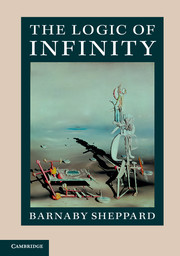Book contents
- Frontmatter
- Contents
- Preface
- Synopsis
- 1 Introduction
- 2 Logical foundations
- 3 Avoiding Russell's paradox
- 4 Further axioms
- 5 Relations and order
- 6 Ordinal numbers and the Axiom of Infinity
- 7 Infinite arithmetic
- 8 Cardinal numbers
- 9 The Axiom of Choice and the Continuum Hypothesis
- 10 Models
- 11 From Gödel to Cohen
- A Peano Arithmetic
- B Zermelo–Fraenkel set theory
- C Gödel's Incompleteness Theorems
- Bibliography
- Index
3 - Avoiding Russell's paradox
Published online by Cambridge University Press: 05 August 2014
- Frontmatter
- Contents
- Preface
- Synopsis
- 1 Introduction
- 2 Logical foundations
- 3 Avoiding Russell's paradox
- 4 Further axioms
- 5 Relations and order
- 6 Ordinal numbers and the Axiom of Infinity
- 7 Infinite arithmetic
- 8 Cardinal numbers
- 9 The Axiom of Choice and the Continuum Hypothesis
- 10 Models
- 11 From Gödel to Cohen
- A Peano Arithmetic
- B Zermelo–Fraenkel set theory
- C Gödel's Incompleteness Theorems
- Bibliography
- Index
Summary
Russell's paradox and some of its relatives
Perhaps the greatest paradox of all is that there are paradoxes in mathematics.
–E. Kasner and J. NewmanThe consequences of the Axiom of Abstraction
In general, a logical paradox is a contradiction, usually expressed in its simplest form Φ ↔ ¬Φ, which reveals a theory to be inconsistent, even though the axioms of the theory seem to be plausible and the rules of inference appear to be valid. The emphasis is on the surprise of the contradiction, the paradox arising unexpectedly in what is intuitively a perfectly sound system. Zermelo, quite early on, suggested the more precise term ‘antinomy’ to describe the phenomenon of contradictions which arise within logical systems, demoting the description ‘paradox’ to those results which are merely counterintuitive but not contradictory.
Contradictions which arise in apparently sensible systems are harsh reminders of our poor intuition regarding large abstract structures. Humans, unfortunately, are very good at cherry-picking attractive sounding ideas without questioning their total lack of empirical foundation and, more to the point, without examining their logical consequences. Even extremely convincing systems can have a sting in the tail, Frege's set theory being an important example. Contradictory systems can be embraced by an individual in the full course of a lifetime without any signs of nausea simply because the system-bearer has not lived long enough, or has not analyzed the system closely enough, to reveal the contradiction.
- Type
- Chapter
- Information
- The Logic of Infinity , pp. 239 - 254Publisher: Cambridge University PressPrint publication year: 2014



